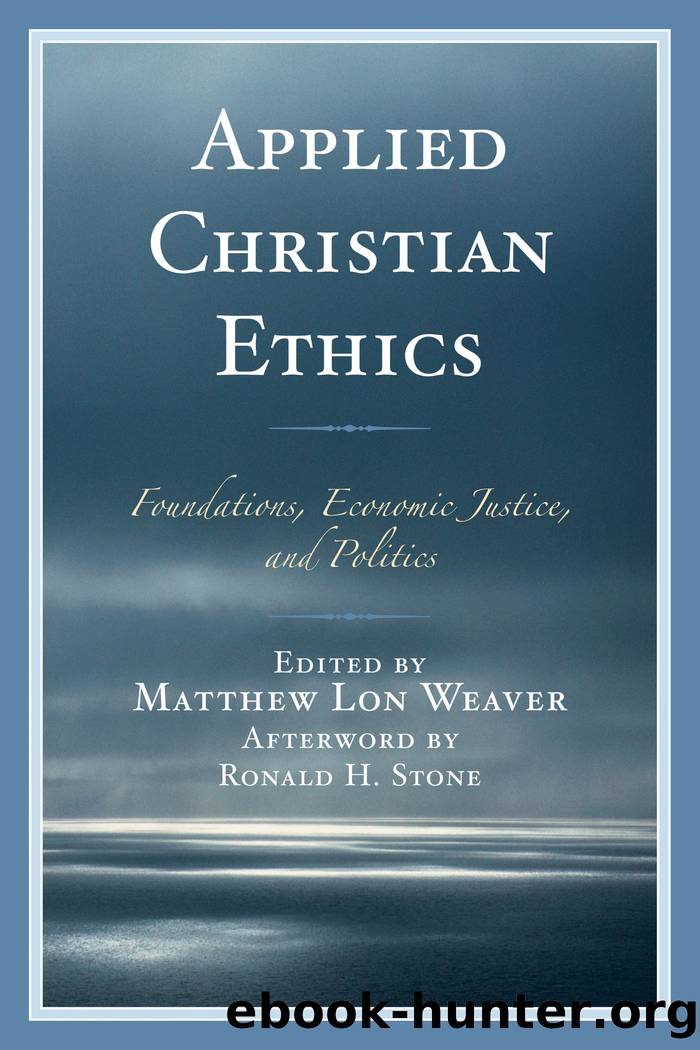Applied Christian Ethics by unknow

Author:unknow
Language: eng
Format: epub
Tags: undefined
Publisher: Lexington Books/Fortress Academic
Published: 2012-08-15T00:00:00+00:00
The report acknowledges that when a 2003 Survey of Presbyterians was conducted, the majority of respondent are opposed to the PC (USA) General Assembly taking a stand on the questions of reparations, recognize that the task of racial reconciliation is not complete in the United States, and are not as well-informed on the history of reparations in America as they should be. On this basis, the writers of the report urged a churchwide study and dialogue of issues related to reparations.
The 2009 General Convention of the Episcopal Church concurred in a Resolution to Repudiate the Doctrine of Discovery. âThis doctrine, which originated with Henry VII in 1496, held that Christian sovereigns and their representative explorers could assert dominion and title over non-Christian lands with the full blessing and sanction of the Church.â The doctrine continues to be invoked in a modified form in court cases and government policy that lead to the colonizing dispossession of the lands of indigenous peoples. The resolution included a mandate for the Episcopal Church to expose the historical reality and impact of the Doctrine of Discovery and its impact on its own policies and programs, and, in addition, to urge governmental bodies in the United States to do a similar review. The resolution urged Episcopalians to support indigenous peoples within the boundaries claimed by the United States in their ongoing efforts for their inherent sovereignty and fundamental human rights. [51] This 76th General Convention directed its Office of Government Relations to advocate for the U.S. governmentâs endorsement of the âUnited Nations Declaration on the Rights of Indigenous Peoples,â which the Obama administration did in 2010. This resolution challenged the legal philosophy undergirding alienation of indigenous peoples from their land. If successful, it will substantiate reparations law.
The Episcopal Church remains actively involved with other religious bodies and voices in the United Nations Permanent Forum on Indigenous Issues (UNPFII), an advisory body to the UNâs Economic and Social Council that has met annually since 2002 to discuss indigenous issues and human rights. The May 7 through 18, 2012 session of the UNPFII special theme was âThe Doctrine of Discovery: Its enduring impact on indigenous peoples and the right to redress for past conquests (articles 28 and 37 of the United Nations Declaration on the Rights of Indigenous Peoples).â
When the United Methodist Church met in General Conference in Tampa, Florida, in April, 2012, an evening plenary session with worship was the occasion for an Act of Repentance âto change its relationship with Native people and become partners in healing the destructive forces of history. There has been little acknowledgment of the Churchâs complicity in the historic physical and cultural extermination policies by the United States, directed at its first people.â[52] But some Native United Methodists believe the church has not sufficiently prepared itself to understand the nature of this act. That is, the remembering of what happened has not been given enough respect nor has the church planned programs and actions that are proportional to the offences against self-determination, sovereignty, and cultural integrity.
Download
This site does not store any files on its server. We only index and link to content provided by other sites. Please contact the content providers to delete copyright contents if any and email us, we'll remove relevant links or contents immediately.
The Lost Art of Listening by Michael P. Nichols(7494)
Why I Am Not A Calvinist by Dr. Peter S. Ruckman(4149)
The Rosicrucians by Christopher McIntosh(3513)
Wicca: a guide for the solitary practitioner by Scott Cunningham(3167)
Signature in the Cell: DNA and the Evidence for Intelligent Design by Stephen C. Meyer(3132)
Real Sex by Lauren F. Winner(3016)
The Holy Spirit by Billy Graham(2944)
To Light a Sacred Flame by Silver RavenWolf(2814)
The End of Faith by Sam Harris(2733)
The Gnostic Gospels by Pagels Elaine(2528)
Waking Up by Sam Harris(2454)
Nine Parts of Desire by Geraldine Brooks(2361)
Jesus by Paul Johnson(2352)
Devil, The by Almond Philip C(2326)
The God delusion by Richard Dawkins(2305)
Heavens on Earth by Michael Shermer(2278)
Kundalini by Gopi Krishna(2180)
Chosen by God by R. C. Sproul(2161)
The Nature of Consciousness by Rupert Spira(2104)
